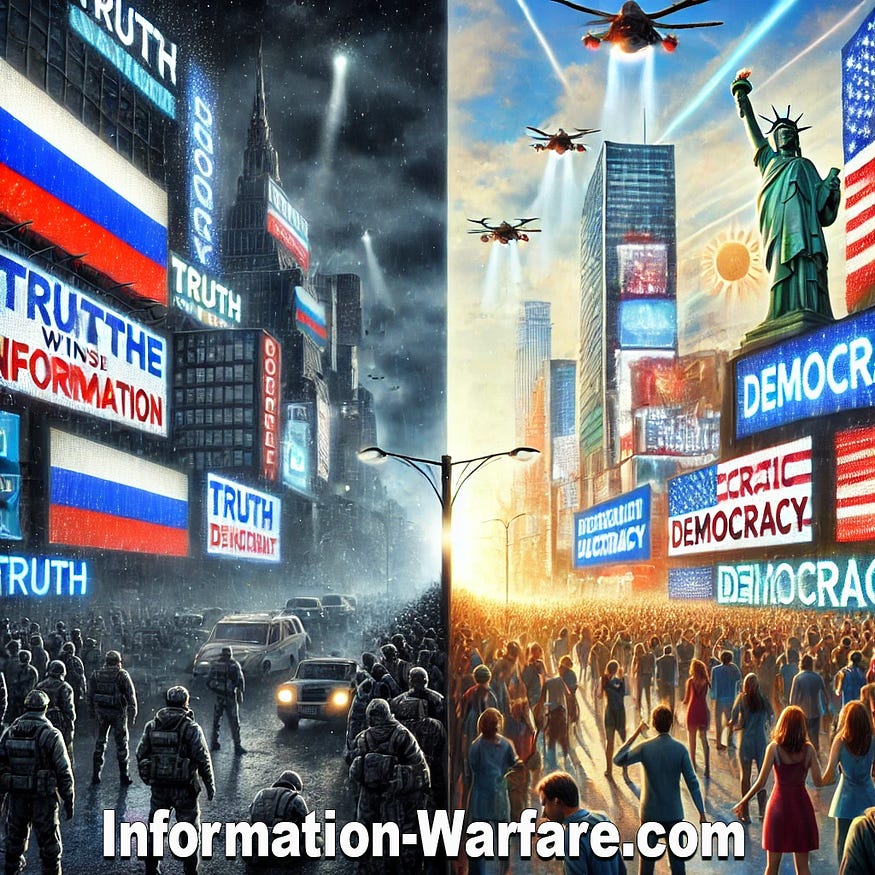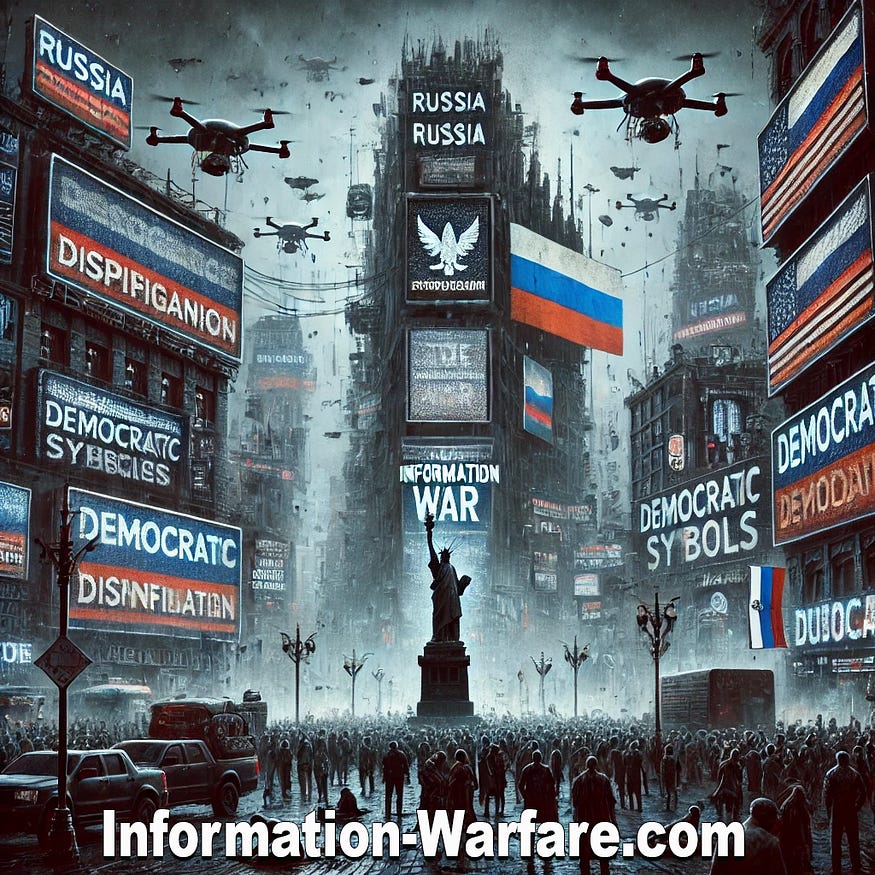A Glimpse into Two Possible Futures After the Information War
A Dystopian Reality if Russia Wins vs. The Triumph of Truth if the United States Prevails
A Dystopian Reality
Russia Wins Information War
The Consequences of Russia Winning the Information War:
In a world where Russia emerges victorious in the ongoing information war, the global landscape would be dramatically altered. The ramifications of such a triumph would extend far beyond geopolitical shifts, permeating societies, economies, and cultures. This article explores the expected outcomes and the dystopian reality that could unfold if Russia were to dominate the narrative on a global scale.
Control Over Global Narratives
If Russia won the information war, the most immediate and profound impact would be its control over global narratives. The Kremlin’s ability to shape and manipulate public perception worldwide would significantly increase. This control would be achieved through widespread disinformation campaigns, propaganda, and the suppression of dissenting voices. The truth would become a rare commodity, obscured by a haze of misleading and false information.
Erosion of Democratic Institutions
A Russian victory in the information war would likely lead to the erosion of democratic institutions around the world. By undermining public trust in democratic processes and promoting authoritarian ideals, Russia could weaken the foundations of democracies. Election interference, targeted misinformation, and cyber-attacks would become more commonplace, destabilizing governments and creating political chaos.
Rise of Authoritarianism
With democratic institutions weakened, authoritarian regimes would find fertile ground to rise and consolidate power. Russia’s success would serve as a model for other authoritarian leaders, showing how control over information can be used to suppress opposition and maintain power. Civil liberties would be eroded, and human rights abuses would become more rampant as authoritarianism spreads.
Suppression of Free Speech and Press
The freedom of speech and the press would face severe suppression. Independent journalists and media outlets would be targeted, silenced, or co-opted. In such an environment, dissenting opinions would be dangerous, and whistleblowers would be at great risk. The public would have limited access to unbiased news, relying instead on state-approved propaganda.
Global Economic Instability
Economic instability would likely follow as Russia’s influence grows. Sanctions and economic pressures from the West, combined with the internal corruption and inefficiencies of authoritarian regimes, could lead to economic downturns. Global markets would be affected by the uncertainty and instability, with trade wars and economic sanctions becoming more prevalent.
Geopolitical Shifts and Alliances
Geopolitically, the balance of power would shift. Traditional Western alliances, such as NATO and the EU, would face significant challenges as member states grapple with internal divisions fueled by misinformation. Countries might pivot towards Russia, either out of coercion or perceived alignment with the new dominant narrative. This shift could lead to new alliances and a realignment of global power structures.
Technological and Cyber Warfare Dominance
Russia’s dominance in the information war would also manifest in technological and cyber warfare superiority. Cyber-attacks on critical infrastructure, financial systems, and communication networks would become more frequent and sophisticated. This cyber dominance would give Russia unprecedented leverage over other nations, further entrenching its power.
Cultural and Social Fragmentation
On a societal level, cultural and social fragmentation would increase. Misinformation and propaganda would deepen existing divides and create new ones. Societies would become more polarized, with distrust and suspicion becoming the norm. Social cohesion would be undermined, leading to increased civil unrest and violence.
A Call for Vigilance
The prospect of Russia winning the information war presents a dystopian future where truth is a casualty, and authoritarianism reigns. The global community must remain vigilant and proactive in countering disinformation and upholding democratic values. Strengthening cyber defenses, promoting media literacy, and supporting independent journalism are crucial steps in this battle. Only through a collective effort can the tide be turned, ensuring that truth and democracy prevail in the face of rising misinformation and authoritarianism.
The Triumph of Truth
United States Wins Information War
Expected Outcomes if the United States Wins the Information War:
In an increasingly interconnected and digital world, the battle over information has profound implications. If the United States were to win the information war, the global landscape would be significantly altered in favor of democratic values, transparency, and truth. This article explores the expected outcomes and the potential for a brighter, more informed future if the U.S. emerges victorious in this critical struggle.
Restoration of Trust in Democracy
A U.S. victory in the information war would bolster global trust in democratic institutions. By effectively countering disinformation and promoting factual reporting, the United States could reinforce the legitimacy of democratic processes. Transparent and credible information would lead to more informed electorates, fairer elections, and stronger, more resilient democracies worldwide.
Strengthening of Free Speech and Independent Media
Winning the information war would enable the U.S. to champion and protect free speech and independent media globally. Journalists and media outlets could operate without fear of retribution, providing the public with accurate and unbiased news. This environment would foster a more informed citizenry, capable of making decisions based on reliable information rather than propaganda.
Global Promotion of Human Rights
With a victory in the information war, the U.S. could more effectively advocate for human rights and counter authoritarian narratives that suppress freedoms. Increased access to truthful information would expose human rights abuses and galvanize international efforts to address them. The global community would be better equipped to support oppressed populations and promote universal human rights.
Economic Stability and Growth
A triumph in the information war would also have positive economic implications. By promoting a stable and transparent global economic environment, the U.S. could reduce market uncertainties caused by disinformation. Trust in financial markets would be restored, encouraging investment and fostering economic growth. Furthermore, international cooperation on economic policies could be strengthened, leading to more equitable and sustainable development.
Geopolitical Stability and Strengthened Alliances
Geopolitically, a U.S. victory would reaffirm and strengthen alliances such as NATO and the EU. By countering misinformation that seeks to divide these alliances, the U.S. would promote unity and coordinated responses to global challenges. A more united Western front would be better positioned to address issues like climate change, international security, and economic inequality.
Technological Advancements and Cybersecurity
Winning the information war would also entail advancements in technology and cybersecurity. The U.S. could lead the way in developing and implementing technologies that secure information and protect against cyber threats. Enhanced cybersecurity measures would safeguard critical infrastructure, financial systems, and communication networks from malicious attacks, ensuring a safer digital environment.
Cultural Exchange and Understanding
A U.S. victory would foster greater cultural exchange and understanding. By promoting accurate and diverse narratives, the U.S. could bridge cultural divides and encourage global collaboration. Educational and cultural programs that emphasize critical thinking and media literacy would empower individuals to discern truth from falsehood, reducing the impact of disinformation.
Promotion of Global Health and Scientific Integrity
Winning the information war would also bolster global health initiatives and scientific integrity. Accurate information dissemination is crucial in combating pandemics and addressing public health challenges. The U.S. could lead efforts to promote scientific research and public health policies based on evidence and facts, ensuring better health outcomes for populations worldwide.
Empowerment of Civil Society
Finally, a U.S. victory would empower civil society organizations to play a more active role in promoting transparency and accountability. These organizations could leverage accurate information to hold governments and corporations accountable, advocating for policies that benefit the public good. An informed and engaged civil society is essential for the health of any democracy.
A Vision for a Brighter Future
The prospect of the United States winning the information war presents an optimistic future where truth prevails, and democratic values are upheld. By championing transparency, free speech, and human rights, the U.S. can lead the world toward a more informed, stable, and equitable global community. This vision requires a collective commitment to countering disinformation, promoting media literacy, and supporting independent journalism. With these efforts, the triumph of truth can be achieved, paving the way for a brighter, more enlightened future.

In Summary
The information war between global superpowers, particularly the United States and Russia, holds profound implications for the future of global society. If Russia wins the information war, the world would face a dystopian reality marked by the control of global narratives through disinformation, the erosion of democratic institutions, the rise of authoritarianism, suppression of free speech, global economic instability, geopolitical shifts favoring authoritarian regimes, technological and cyber warfare dominance by Russia, and increased cultural and social fragmentation. This scenario presents a future where truth becomes a rare commodity, and authoritarianism reigns.
In contrast, if the United States wins the information war, the world would see the triumph of truth and democratic values. A U.S. victory would restore trust in democratic institutions, strengthen free speech and independent media, promote human rights, foster economic stability and growth, reinforce geopolitical alliances, advance technological and cybersecurity measures, encourage cultural exchange and understanding, enhance global health and scientific integrity, and empower civil society. This optimistic future hinges on the effective countering of disinformation, promotion of media literacy, and support for independent journalism, leading to a more informed, stable, and equitable global community.
In Conclusion
The outcome of the information war between the United States and Russia will significantly shape the global landscape for years to come. A Russian victory would lead to a dystopian reality characterized by misinformation, authoritarianism, and instability. Conversely, a U.S. victory would champion truth, democracy, and global cooperation. The stakes are incredibly high, and the global community must remain vigilant in countering disinformation, promoting critical thinking, and supporting independent journalism. By striving for the triumph of truth, we can pave the way for a brighter, more enlightened future where democratic values and human rights are upheld, ensuring a stable and prosperous world for generations to come.
The information war is different from every other war; information warfare is not the same as conventional warfare. It is different in that bullets are not exchanged, but rather disinformation campaigns and active measures are employed.
If humans and citizens reach a level of intellectual enlightenment and critical thinking, they will be better equipped to navigate the complexities of the information war. Like SPAM, which persists despite anti-spam solutions, disinformation will continue to be a challenge. Ultimately, it is up to the end user to recognize and understand the nuances of disinformation. The solution lies in the collaboration between the population and the government to develop strategies that enable citizens to distinguish between accurate information and false narratives. A practical approach could be to extend the mandate of the FCC to include the internet, providing a rating system for networks that classify opinion news, real news, and other types of information.



